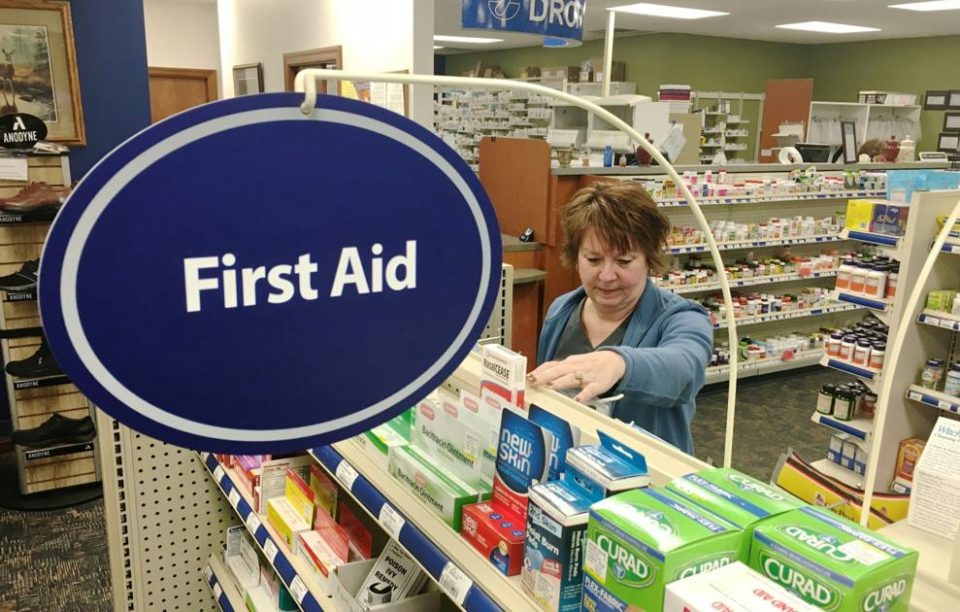MICHAEL ROKNICK | Herald
Jan Ballard, a pharmacy technician at The Medicine Shoppe in Hermitage, checks on supplies at the pharmacy on Thursday. Like other drug stores nationwide, due to fears of the coronavirus, formally known as COVID-19, the Hermitage store ran out of face masks two weeks ago and so far hasn’t been able to get in new supplies.
HERMITAGE – Under normal circumstances, The Medicine Shoppe in Hermitage stocks only about two or three boxes of white surgical-style masks, since demand is normally very low.
But these aren’t normal circumstances. With the expected arrival of coronaviruses in western Pennsylvania, people are looking for masks like the ones they are seeing on television.
Medicine Shoppe owner Rhonda Yarzab said the pharmacy has sold out of the boxes, which contain three to four masks each. Restocking the supply is going to be difficult because her wholesaler suppliers are experiencing shortages because of the coronavirus concerns.
“Typically in the past we’ve had very limited need or request for it, such as with the flu since the elderly will try to limit their exposure to it,” Yarzab said.
Aside from masks, Yarzab said she had also received inquiries about possible shortages of drugs from China. However, none of the wholesalers had reported any shortages of the medications, which Yarzab said were general maintenance drugs.
The U.S. Centers for Disease Control and Prevention reported the first U.S. death from COVID-19, the virus that causes coronavirus disease. Worldwide, almost 3,000 have died from the disease.
Lisa DiMuccio-Zgela, Sharon Regional Medical Center’s director of marketing and community relations, said hospital officials are continuing to monitor the national and global situation, and is prepared to safely care for any ill patients.
But local health care professionals are also worried about ongoing annual concerns over the flu, which is, at least for now, more prevalent than coronavirus.
Dr. David Shellenbarger, medical director for Sharon Regional’s emergency care services, said he recommends that people: wash their hands often and thoroughly with warm water and soap, or an alcohol-based hand cleanser; cover their mouths and noses with a flexed elbow or tissue when sneezing or coughing; avoid touching their mouths, noses and eyes; and stay home if they feel sick.
Anyone experiencing a cough, fever and or shortness of breath, or those who have traveled to China or have been in close contact with someone who has, should contact a physician, said hospital officials.
Those who need to go to an emergency room should notify the hospital beforehand or when arriving to request and wear a face mask and to avoid contact with other people.
Lisa Lombardo, a spokeswoman for UPMC Horizon in Farrell and Greenville, and UPMC Jameson in New Castle, said staff within the system is staying informed and taking precautions to allow for treatment protocols that are safe for patients and health care providers.
That includes disseminating information, including travel screening alerts and briefings. The hospital has been carrying out drills on coronavirus response, she said.
Lombardo said the preparations for coronavirus includes discussing and drilling with government authorities at all levels, including the federal and state governments.
Some of that work has been coordinated by the Hospital and Healthsystem Association of Pennsylvania, which has conducted pandemic exercises with hospitals across Pennsylvania as far back as 2007.
The agency serves as a liaison for a conduit for as healthcare providers, nursing homes, hospitals and EMS responders, said Mark Ross, vice president of the association’s Emergency Management Team.
“Unfortunately in our job, we always make sure that we’re prepared for the worst, but we hope it doesn’t come to that,” Ross said.
With coronavirus, the emergency management team communicates with healthcare providers not only in the state, but also across the nation to learn what treatments or tactics have been effective, and to help local hospitals prepare for disaster.
Such measures aren’t unique to the coronavirus. In 2009, the H1N1 flu outbreak required the association to recommend restrictions for visitors at some hospitals.
“We’re consistently working with our peers at a state and federal level, and that occurs on a multiple-time-a-day basis, and we’re doing not only information sharing, but also best practices sharing or lessons learned,” Ross said.
Despite the growing concerns over COVID-19 and the reported deaths overseas, Ross stressed that COVID-19 is not necessarily a fatal disease, and some countries are even using home isolation. In about 20,000 cases, Ross said those affected by the disease appear to have already overcome it.
“This disease is truly affecting individuals that have other pre-existing conditions, as they’re the ones getting more severely ill from the disease, but of the 15 cases in the U.S., many of them are already doing better,” he said.
Ross did stress that aside from maintaining basic hygiene practices, those affected should stay at home and contact a primary care provider.
Ross said it is important for people to remain calm and understand not only that the coronavirus is not necessarily as deadly as it may appear, but that healthcare providers have spent years training and preparing for such an event.
“Pennsylvania and Pennsylvania’s hospitals are prepared,” he said. “We’re hoping the disease doesn’t affect the citizens of the commonwealth, but we are prepared if the disease does come here.”


